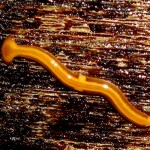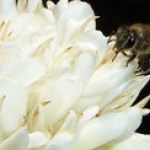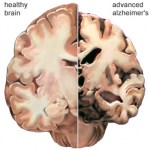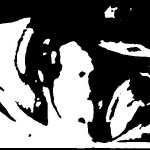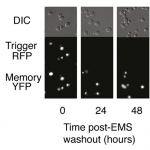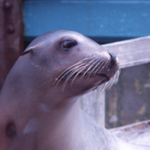memory
I know this is not a comparative physiology topic, but this article caught my attention as I know I just ate a rather high fat meal last week for Thanksgiving and I plan to do the same throughout the holiday season.
Insulin does more than just lowering blood sugar by increasing its uptake into tissues. It can also increase blood flow to the hippocampal region of the brain to help cognitive function. This area of the brain is important in memory formation and spatial orientation. A new study published in the American Journal of Physiology - Endocrinology and Metabolism used…
“Inclusion bodies – those clumps of protein that are found in the brain cells of Alzheimer’s patients – are, sadly, a product of aging,” says Dr. Maya Schuldiner. “They can form naturally in practically all cells, but when these cells get old, the mechanism for clearing them away starts to fail.”
That is not great news for those of us who are already seeing signs of incipient dementia every time we forget a name or misplace our keys. But of course there is good news too. Schuldiner has discovered a “detergent” that cells make to wash away those nasty protein clumps. And she believes that, in…
I recently received the following question from a reader based on a prior blog entry on how a medication used to treat epilepsy also helps reverse memory loss with Alzheimer's disease. You can see the original blog here
Question:
"I find it a little confusing as to how it is possible that this medication can improve brain and memory function but at the same time cause cognitive impairment? Is that not contradictory that the meds are suppose o help the brain but the side effects are related to the brain? Did the research account the facts that humans do not share all the same proteins as…
Get rid of your addictions while you sleep? Weizmann Institute researcher Dr. Anat Arzi is not promising this yet, but she and Prof. Noam Sobel have shown that changing bad habits through sleep conditioning could someday be possible. After just one session in the Neurobiology Department’s sleep lab, volunteers reported smoking on average 30% fewer cigarettes over the course of a week.
Volunteers given the same conditioning while awake did not reduce their nicotine consumption.
Arzi and Sobel had first demonstrated true sleep learning in 2012. This is the same conditioning that Pavlov…
A recent article published in the American Journal of Physiology reviewed how the brain regulates feeding behaviors. Humans are not the only species to eat food in spurts we like to call meals. Research suggests that this behavior may actually aid survival as it reduces exposure time to the environment and makes responding to fluctuations in the availability of food a bit easier to deal with. Dr. Marise Parent and colleagues at Georgia State University wanted to find out how your body determines when to initiate eating as well as how long the interval between meals should be.…
Figure from Journal of Experimental Biology.
Researchers Tal Shomrat and Michael Levin at Tufts University have found that planaria worms are able to quickly relearn lost skills after literally losing their heads. The researchers trained the worms to find food in an environment with bright light and open space, both considered uncomfortable to the creatures. The time it took for worms to adjust to the environment and find food was recorded. Then, the researchers severed their heads and waited for the head and brain to regenerate (see image above). What…
Kai, a dolphin involved in the study, was able to recognize the whistle of a fellow dolphin that Kai had not seen in years. Image by: Jason Bruck
Another reason to marvel at dolphins. As a follow up to the previous blog on dolphins calling each other by name, new research from Dr. Jason Bruck at the Institute for Mind and Biology (University of Chicago) shows that dolphins have the longest memory known in animals. In addition to Kai, shown above, a dolphin named Bailey recognized the whistle of Allie, even though they had not seen each other in more than 20 years! I am fairly…
Honeybee visiting a coffee flower, photo from Geraldine Wright
Apparently humans and honeybees share something in common when it comes to caffeine. Dr. Geraldine Wright (Newcastle University, England) discovered that bees are more likely to return to flowers that produce nectar containing caffeine. Their data suggest caffeine improves memory in bees. Caffeine is present in higher concentrations in the leaves and other tissues of the plant where it provides the added benefit of warding off predators.
According to a quote from The New York Times by Dr. Robert a Raguso at…
“Imagine that you wake up in the morning feeling nothing special, yet you find yourself inexplicably behaving just a bit differently during the day. For example, you take a sniff every time you hear a tone,” says Prof. Noam Sobel. Of course, the people this actually happened to knew they had volunteered for a sleep experiment in Sobel’s lab. They knew that their sleep patterns had been closely monitored. But they had no recall, whatsoever, of the “lesson” they had learned while snoring peacefully. It was the sniffing that gave it away: While asleep, they had undergone conditioning to…
Image from: Alzheimer's Association
Researchers Sanchez et al. from the Gladstone Institute, University of California San Franciso and Washington University School of Medicine discovered that an FDA-approved anti-convulsant medication used to treat epilepsy (levetiracetam) can also reverse memory loss in addition to reducing other Alzheimer's related symptoms in a mouse model of the disease.
Alzheimer's is currently the most common form of dementia (memory loss) representing 50-80% of cases. It is a disease that worsens over time. Although there are available medications…
If you followed this year's chemistry Nobel, you know about the quasicrystal design on the ties made for Prof. Dan Schechtman's 70th birthday. Even the prime minister was seen sporting one last week. But did you know there is also a quasicrystal scarf?
While Prof. Schechtman was getting his white tie and tails ready for the formal ceremony, this scarf was on display in fashionable Tel Aviv around the shoulders of Prof. Gitti Frey, a nanoscientist at the Technion.
Despite the photo op, fashion took a back seat to science last Thursday evening. Frey was the guest speaker at a Science on Tap…
Do you ever doubt your own memory? New research at the Institute suggests that some of the things we think we remember could be wrong. It seems that our brains are surprisingly willing to exchange a true memory for a false one, just on the basis of friends' claims. The scientists not only demonstrated just how easy it is to create false memories, they showed that the switch in memory has a signature pattern of brain activity. The most significant feature? They found strong connectivity between areas of the brain known to be involved in memory and learning, and the amygdala, which, among other…
Disturbing experiences don't actually heighten our perceptions. In fact, according to new Weizmann research, in adverse conditions we're more likely to experience slightly different sights or sounds as being the same. The scientists think that this lumping together of similar sensory stimuli may be behind post-traumatic stress syndrome. The experiments showed that volunteers learning to distinguish between similar tones had much more trouble telling them apart when these were associated with a shockingly bad smell. Dr. Rony Paz explains that this blurring of our perceptions may have helped…
THE patterns of brain waves that occur during sleep can predict the likelihood that dreams will be successfully recalled upon waking up, according to a new study published in the Journal of Neuroscience. The research provides the first evidence of a 'signature' pattern of brain activity associated with dream recall. It also provides further insight into the brain mechanisms underlying dreaming, and into the relationship between our dreams and our memories.
Cristina Marzano of the Sleep Psychophysiology Laboratory at the University of Rome and her colleagues recruited 65 students,…
Last month I wrote about my friend Devin Burrill's paper about synthetic memory in yeast cells. There were a lot of really interesting questions left in the comments, and I asked Devin if she would write a guest post to answer them. She agreed and here it is, answers to your questions straight from the author!
Hello Readers!
My name is Devin, and I am so incredibly grateful to Christina for allowing me to write an entry on her awesome blog. Christina and I are friends and work together in the lab of Pamela Silver at Harvard Medical School. I am writing in response to a number of excellent…
Today's Weizmann Institute news stories include two new papers from the prolific lab of Prof. Yadin Dudai. The first is on a protein that boosts memory in rats. Dudai and his group have been investigating this protein for several years. Previously, they had managed to show that blocking the protein, even for a very short time, erases memories. Now, they have demonstrated that adding more of the protein to certain areas of the brain can strengthen memory. Note: They increased the protein via gene-carrying viruses that infiltrated the rats' brain cells - not a clinic-ready technique. But until…
THE human gut contains a diverse community of bacteria which colonize the large intestine in the days following birth and vastly outnumber our own cells. These intestinal microflora constitute a virtual organ within an organ and influence many bodily functions. Among other things, they aid in the uptake and metabolism of nutrients, modulate the inflammatory response to infection, and protect the gut from other, harmful micro-organisms. A new study by researchers at McMaster University in Hamilton, Ontario now suggests that gut bacteria may also influence behaviour and cognitive processes such…
Cells permanently change their behavior in response to temporary changes to the environment, a kind of biological memory that controls processes as important and complex as how stem cells differentiate into specific tissues or how the immune system "remembers" dangerous pathogens. At its simplest, cellular memory is achieved with a positive feedback loop--once activated by some external signal, the feedback loop will continually activate itself, even as the cell divides and the signal is taken away. In synthetic biology we can recreate such simple feedback loops, genetic circuits built of…
SUZANNE Corkin is a professor of behavioural neuroscience at the Massachusetts Institute of Technology who worked with the famous amnesic patient H.M. for more than 45 years. I interviewed her at the annual meeting of the Society for Neuroscience in San Diego last month, for this article I wrote for The Dana Foundation. We talked about her work with H.M., and about the project to examine his brain now that he has died, which was partly funded by Dana. The transcript of our conversation is below.
How long did you work with H.M.? Did he ever know who you were? What was he like?
I…
Meet Rio.
Rio is a California Sea Lion (Zalophus californianus). She was born in captivity at Marine World in Northern California, and due to insufficient maternal care from her biological mother, she was transferred to the Long Marine Laboratory at UC Santa Cruz when she was just a few days old. There, she was raised by a human surrogate mother, in the context of an imprinting study. She's got a pretty good life. She gets all the fish she could want, and has 3 other pinniped (seals, sea lions, otters) friends at the lab. There's Burnyce, a female Northern elephant seal, Sprouts, a male…



